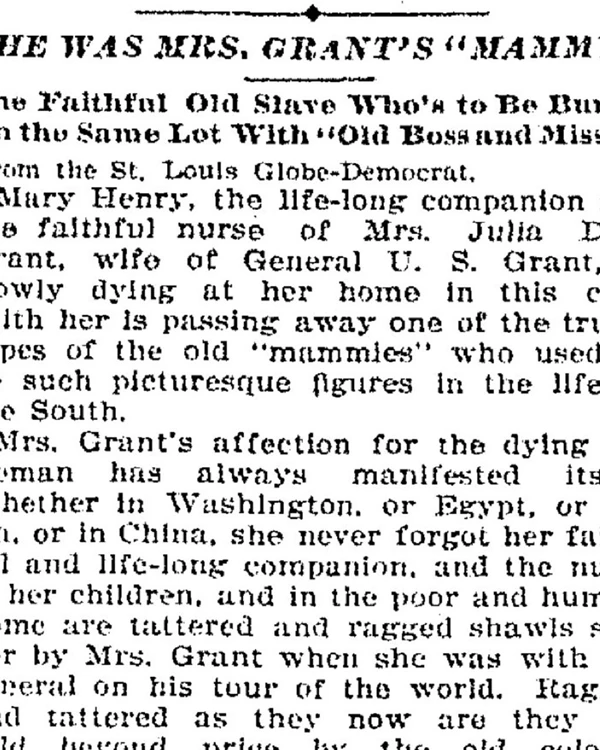Last updated: June 5, 2024
Person
Mary Henry

NewsBank, Inc.
Mary Henry was enslaved by First Lady Julia Dent Grant's family prior to the Civil War. She was interviewed by the St. Louis Globe-Democrat on April 22, 1900 and discussed her life at White Haven. A few months later, an obituary in The St. Louis Republic announced her death from cancer.
According to the St. Louis Globe-Democrat article, Mary was born "a year or two" before Julia Dent Grant and the two were playmates while growing up at White Haven. She claimed to have been a close companion of Julia Dent Grant for many years. "I stood as close to her as she was being married as you to my bed," she proclaimed. "When her children were born, they were handed to me as they came into the world, and it was my hands that first put on them the clothes that my hands had made. For eleven years after Mrs. Dent (Julia Dent Grant's mother, Ellen Wrenshall Dent) died I kept house for 'Old Boss' [at White Haven]." She also claimed to have spent time with Julia Grant during a visit to the Southern Hotel in 1883, while another article from 1915 stated that she participated in the funeral for Grant hosted in St. Louis following his death on July 23, 1885.
Of Ulysses S. Grant, Henry recalled that "he had a great teasing way about him and always liked to plauge me. He was the oldest [at White Haven], but always claimed I was older than he was." She also claimed that "the saddest time of my life was when 'Old Boss' left the farm and came in to St. Louis. He shook hands with all the servants and told them good-by. I was hanging back to be the last. When he shook hands with me two big tears ran down his cheeks."
While this newspaper interview demonstrates that Mary Henry was enslaved at White Haven and knew Ulysses and Julia Grant personally, her claim that Frederick F. Dent left White Haven during the Civil War and essentially emancipated his enslaved laborers by saying "good-by" and leaving them to run the property is not supported in other accounts, nor is there any legal paperwork to confirm that Dent manumitted any enslaved laborers during the Civil War. In fact, Julia Dent Grant claimed in her Personal Memoirs that the remaining enslaved laborers at White Haven left the property on their own accord by early 1864. Likewise, one might also take Mary's "saddest time of my life" comment with a grain of salt given that the St. Louis Globe-Democrat editor tried to use this interview to romanticize slavery in St. Louis before the Civil War.
After the Civil War, she married a man who had also been enslaved at White Haven, but her obituary does not name him. They had three children: Phillis Pitts (1841-1915), Jason, and an unnamed son who lived in New Orleans.
The St. Louis Globe-Democrat article claimed that Mary Henry had recently recieved a check from Julia Dent Grant to help pay for a burial plot at Bellefontaine Cemetery in North St. Louis (where Julia's parents are buried). Her obituary also announced that she was to be buried there. However, a search of Bellefontaine Cemetery's burial records indicates that while several women named Mary Henry are buried at the cemetery, no one by that name was buried there between 1867 and 1911. Moreover, there are no enslaved people known to be buried within the Dent family plot. There is a chance she is buried at an unmarked grave within a section reserved for paupers, as her obituary noted that she was badly impoverished at the time of her death.
